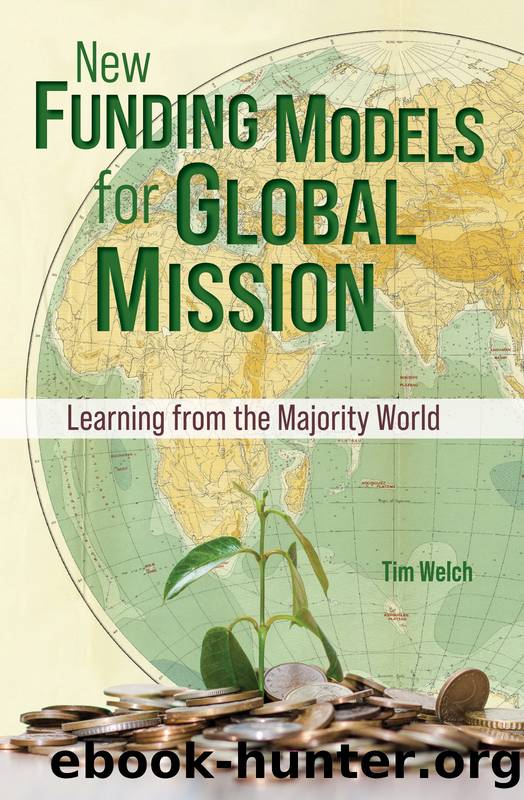New Funding Models for Global Mission by Welch Tim;

Author:Welch, Tim; [Welch, Tim]
Language: eng
Format: epub
Publisher: William Carey Publishing
What Is the Appropriate Manner of Giving?
In the New Testament there are also several principles about how to contribute financially to Godâs work; they are not limited to gifts made toward world mission. These principles apply universally to all contributions to the Christian church and its various ministries.
Proportional to Income
The amount of what is given to God is in proportion to oneâs income (1 Cor 16:2). This means that each person should know their income and then think ahead about how much they can set aside for Godâs work. When Paul arrived, it would no longer be a matter of collecting money for the financial need in the Jerusalem church, but simply collecting what had already been contributed. Implicit in this passage is the idea of a family budget: knowing ahead of time how much money would generally come in and go out. At the same time, the idea of voluntary donations is also implicit in this text, for each person should âset aside a sum of money.â John MacArthur comments (2006, 1769):
The N.T. never specifies the amount or percentage of what should be given for the Lordâs work. Every offering to the Lord must be voluntary and made on the basis of a personal decision.
The goodwill of those who contributed financially is also mentioned in 2 Corinthians 8:10â12 and 9:2. This verse, 1 Corinthians 16:2, also talks about putting money aside on the first day of the week, thus dealing with contributing regularly in order to support ministry, but I have already discussed the principle of regular giving above.
With Generosity
A parallel principle is that of generosity toward Godâs work. Regarding gifts to the suffering believers in Jerusalem, the Apostle Paul encouraged the Christians in Corinth to âsow generouslyâânot with reluctance or compulsion, but rather with cheerfulness (2 Cor 9:6â7). If one can give according to oneâs revenue, according to the preceding principle, there is also a case for giving beyond oneâs means, as the Christians of Macedonia did (2 Cor 8:3). It is obvious that such generosity can apply to any type of charity, from world mission to donations on behalf of the needy.
We note in several of these examples that those who give are not rich; poor believers can also be generous. This same principle is seen in Acts 11:29, where, in Antioch, âthe disciples, as each one was able, decided to provide help for the brothers and sisters living in Judea.â We see it again in 2 Corinthians 8:2, where the believers in Macedonia, despite âtheir extreme poverty,â showed a ârich generosityâ because of âtheir overflowing joy.â Generosity is more a state of the heart than of the wallet, and this generosity can be applied to any work of God, including world mission.
Multiple People to Manage Money
A final principle is that many people are better than one person when dealing with money. In 1 Corinthians 16:3â4 we see that Paul proposes âthe men you approveâ to carry the collection to Jerusalem and he volunteers to accompany them. In 2 Corinthians 8 we see that Titus was involved in fundraising (vv.
Download
This site does not store any files on its server. We only index and link to content provided by other sites. Please contact the content providers to delete copyright contents if any and email us, we'll remove relevant links or contents immediately.
The 5 Love Languages: The Secret to Love That Lasts by Gary Chapman(9292)
The Space Between by Michelle L. Teichman(6579)
Assassin’s Fate by Robin Hobb(5858)
Wiseguy by Nicholas Pileggi(5323)
Everything Happens for a Reason by Kate Bowler(4480)
Gerald's Game by Stephen King(4379)
Pillow Thoughts by Courtney Peppernell(4020)
A Simplified Life by Emily Ley(3971)
The Power of Positive Thinking by Norman Vincent Peale(3865)
Resisting Happiness by Matthew Kelly(3197)
Girl, Wash Your Face by Rachel Hollis(3127)
Harry Potter and the Prisoner of Azkaban (Book 3) by J. K. Rowling(3116)
Being Aware of Being Aware by Rupert Spira(3087)
Real Sex by Lauren F. Winner(2869)
The Code Book by Simon Singh(2864)
More Language of Letting Go: 366 New Daily Meditations by Melody Beattie(2851)
Name Book, The: Over 10,000 Names--Their Meanings, Origins, and Spiritual Significance by Astoria Dorothy(2842)
The Holy Spirit by Billy Graham(2779)
The Secret Power of Speaking God's Word by Joyce Meyer(2755)
